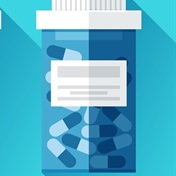Russian gangs and their Chinese associates are making billions of rands from selling fake and unlicensed medicines over the Internet, putting thousands of people at risk, British police and medical regulators said.
The criminals sell the potentially hazardous products through legitimate-looking pharmacy websites run from Russia, with their IT infrastructure routed through China to try to evade detection, they said.
More than 2.5 million doses of counterfeit, controlled and withdrawn drugs were seized across 79 countries in seven days of raids coordinated by international police organisation Interpol under an operation code named Pangaea.
"Every one of those doses could potentially cause harm," said Nimo Ahmed, head of enforcement at Britain's Medicines and Healthcare products Regulatory Agency.
Websites target students
The drugs seized included treatments for epilepsy, asthma, acne, narcolepsy, erectile dysfunction, breast cancer and weight loss.
British regulators were particularly concerned about a recent rise in websites and blogs targeted at students studying late at night for exams, advertising alertness-enhancing drugs such as Modafinil, Ahmed said.
The drug, marketed as Provigil by its US maker Cephalon, was originally licensed in Europe for night workers but regulators subsequently restricted its use because of potential side effects including depression and suicidal feelings.
"It is hitting blogs as a medicine that students can take," said Ahmed. "This is picking up a demand of its own and we need to get that across to universities."
Drugs not checked for quality
Governments are struggling to contain a rising tide of illegal medicine sales, with the World Health Organization, estimating that half of all drugs bought from websites that conceal their physical address are counterfeit.
Many fake drugs will contain lower than specified doses of the medicine's underlying compounds, are not checked for quality and may not dissolve to deliver their dose properly in the gut when taken, regulators say.
Detectives had identified 500 illicit pharmaceutical websites operating in Britain's ".uk" domain as part of the Interpol crackdown, and had asked internet authorities to shut them down, police said.
"The vast majority of these sites are either being run, hosted or facilitated by the Russians or the Chinese," said Detective Superintendent Charlie McMurdie, head of Scotland Yard's e-crime unit.
India main source
"Although it is bad enough that these sites are selling harmful drugs, they are also making millions if not billions of rands from the proceeds of crime," she added.
Much of the counterfeit medicine came from Chinese suppliers, while India was the main source of unlicensed drugs.
The websites closed from British domains were run by around 20 criminal groups mainly based in Russia, police said.
Main players identified
Coordinated operations were underway to tackle the gangs at source, said Detective Sergeant Stephen Truick, an e-crime specialist working in McMurdie's unit.
"We have identified some of the main players, but of course they are not only attacking the UK, they are attacking globally, and part of the work we are now developing is how we are going to go after them," he said.
British police were working closely on the issue with "our American colleagues and colleagues in other countries", he added.
(Reuters Health, September 2011)
Read more:




 Publications
Publications
 Partners
Partners










